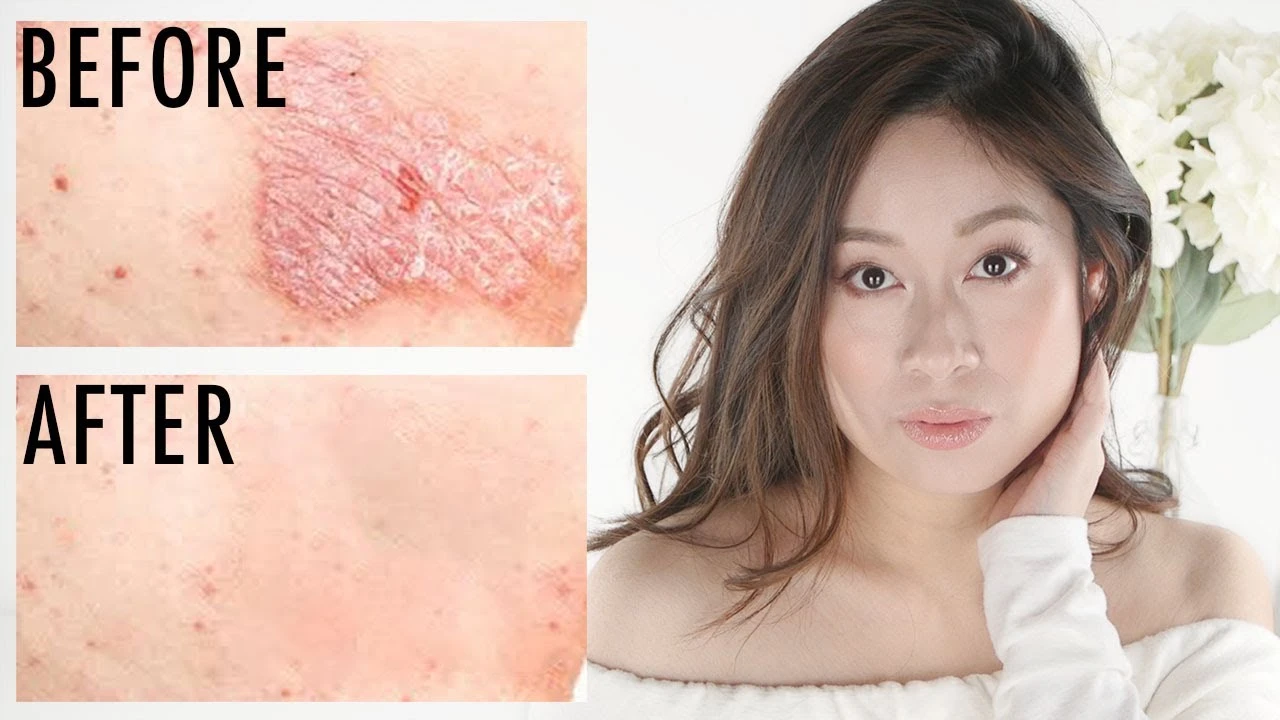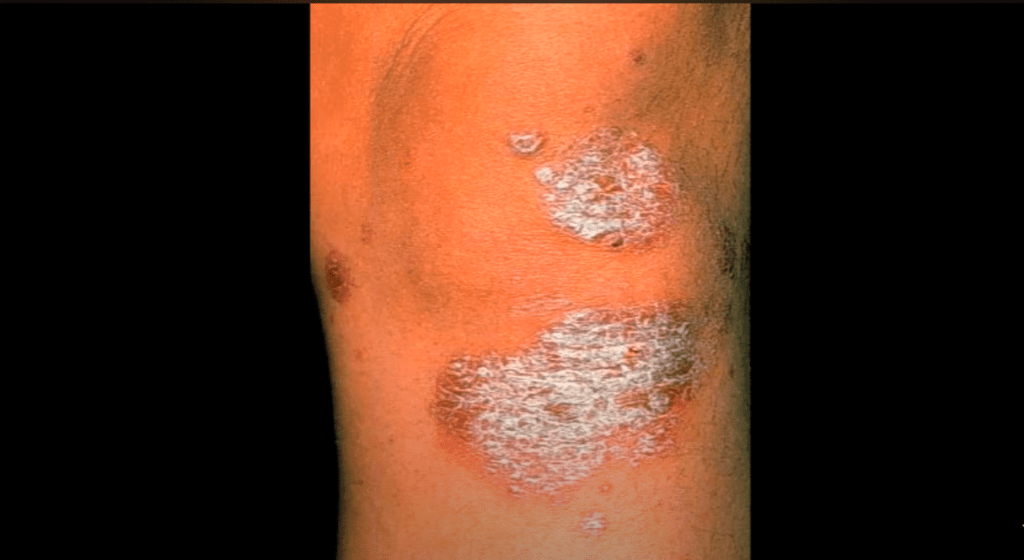Can I get rid of psoriasis?
Psoriasis is a chronic autoimmune skin condition that affects millions of people worldwide. Characterized by red, scaly patches on the skin, it can cause physical discomfort and have a significant impact on an individual’s quality of life. If you’re wondering whether it’s possible to get rid of psoriasis completely, this blog post aims to provide you with valuable insights and guidance.

What is Psoriasis and Can I get rid of psoriasis?
Psoriasis is a chronic skin condition characterized by red, scaly patches that can appear anywhere on the body. It occurs when the immune system becomes overactive, triggering an accelerated production of skin cells. The excess skin cells accumulate on the surface, leading to the formation of thick, flaky patches. Psoriasis can be uncomfortable, itchy, and even painful at times, affecting both physical and emotional well-being. While there is no cure for psoriasis, various treatment options and lifestyle changes can effectively manage the symptoms and provide relief for those living with the condition.
Understanding Psoriasis:
Psoriasis is a complex condition with various factors contributing to its development. It occurs when the immune system mistakenly triggers an overproduction of skin cells, leading to characteristic patches. While the exact cause is unknown, certain risk factors such as genetics, environmental triggers, and immune system dysfunction can play a role.
Read Also: Ulcerative Colitis: Navigating the Brilliant Path to Wellness in 1 month
Can I get rid of psoriasis? and Treatment Options for Psoriasis:
While there is no definitive cure for psoriasis, several treatment options can effectively manage the symptoms and improve the condition on How Can I get rid of psoriasis. These include:
Topical Treatments:
- Corticosteroids and retinoids: These anti-inflammatory creams and ointments help reduce redness and itching.
- Calcineurin inhibitors and coal tar preparations: They can slow down excessive skin cell production and alleviate symptoms.
Systemic Medications:
- Methotrexate and cyclosporine: These medications work by suppressing the immune system to reduce inflammation and slow down cell turnover.
- Biologic drugs and targeted therapies: These newer treatments specifically target the immune system molecules responsible for psoriasis, offering more precise and effective results.

Phototherapy and Light-Based Treatments:
- UVB therapy and psoralen plus ultraviolet A (PUVA): These light treatments can slow skin cell growth and reduce inflammation.
- Excimer laser and photodynamic therapy: They target specific areas of the skin, delivering controlled doses of light to treat affected patches.
Read Also: Wolf Haircut Trend Taking Over the Salon Scene:Unleash Your Wild Side in 2023
Alternative and Complementary Approaches:
While not scientifically proven, some individuals find relief through natural remedies, such as aloe vera, fish oil supplements, and moisturizers. Additionally, adopting a healthy lifestyle, including stress reduction techniques, regular exercise, and a balanced diet, may contribute to overall well-being and potentially improve psoriasis symptoms.
Managing Psoriasis:
Although getting rid of psoriasis entirely may be challenging, various strategies can help manage the condition effectively on How Can I get rid of psoriasis? These include:
- Following a consistent skincare routine, including moisturizing and gentle exfoliation.
- Managing stress through techniques like meditation, yoga, or therapy.
- Finding support through joining support groups or seeking professional counseling.
- Identifying and avoiding triggers that worsen flare-ups, such as certain foods or environmental factors.
Seeking Professional Help or Can I get rid of psoriasis?
Consulting a dermatologist or healthcare provider who specializes in psoriasis is essential for an accurate diagnosis and personalized treatment plan. They can offer expert guidance, monitor your progress, and adjust your treatment approach accordingly on How Can I get rid of psoriasis? . Additionally, engaging with support groups and utilizing patient resources can provide valuable emotional support and practical advice from others who understand your journey.
Read Also: The Edgar Haircut Trend: A Cut Above the Rest Best of 2023
Watch Psoriasis on YouTube:
Conclusion:
While psoriasis may not yet have a cure or many questions put up like Can I get rid of psoriasis the good news is that numerous treatment options and management strategies exist to help individuals effectively control their symptoms and improve their quality of life. By understanding the condition, exploring various treatment avenues, and seeking professional support, it’s possible to find relief and successfully manage psoriasis. Remember, each person’s experience with psoriasis is unique, so finding the right approach may require patience and persistence. With the right resources and support, you can take charge of your psoriasis journey and lead a fulfilling life.
Remember, this blog post is just a starting point, and you can modify it according to your specific requirements, add personal experiences, or include additional information to make it more engaging and informative.
FAQs
- Can I get rid of psoriasis or cured?— Psoriasis is a chronic condition, meaning there is currently no known cure. However, there are various treatments available that can effectively manage the symptoms and provide relief.
- Are there any home remedies that Can I get rid of psoriasis? -While there are no proven home remedies for psoriasis, some individuals find certain natural remedies helpful in managing their symptoms. Examples include aloe vera, tea tree oil, apple cider vinegar, and oatmeal baths. It’s important to note that these remedies may not work for everyone, and it’s best to consult with a healthcare professional before trying them.
- Can stress trigger psoriasis flare-ups?– Yes, stress is known to be a common trigger for psoriasis flare-ups. High levels of stress can worsen the symptoms and lead to more frequent outbreaks. Implementing stress management techniques such as meditation, exercise, and engaging in relaxing activities can help reduce the impact of stress on psoriasis.
- What are the side effects of systemic medications for psoriasis?– Systemic medications used for psoriasis can have potential side effects, and the specific side effects can vary depending on the medication. Common side effects may include nausea, headache, fatigue, and increased susceptibility to infections. It’s important to discuss potential side effects with your healthcare provider before starting any systemic medication.
- Are biologic drugs safe for long-term use or Can I get rid of psoriasis?– Biologic drugs have been shown to be effective in managing psoriasis symptoms for many individuals. While they are generally considered safe, there can be some risks associated with long-term use. These risks include an increased susceptibility to infections and potential side effects on the immune system. It’s important to have regular check-ups with your healthcare provider and discuss any concerns you may have about long-term use of biologic drugs.




